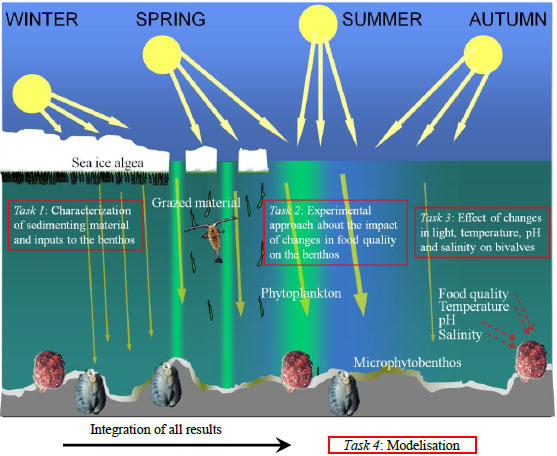Objectives of the project
Because of the ice-dependent character of Arctic marine ecosystems, climate-induced changes in sea-ice cover are expected to lead to shifts in primary production (decrease of ice algal production, increase in phytoplankton and microphytobenthos production) and changes in sea water chemistry (lower salinity and pH, higher temperature). Those changes will have repercussions on the entire ecosystem functioning and carbon cycling, although it is yet unclear how benthic organisms will respond to those changes in food sources and environmental conditions.
Traditionally, the study of the Arctic Ocean has mainly been carried out by countries surrounding the Arctic Ocean, i.e. Canada, USA, Norway, Denmark and Russia. However, since climate change is felt first and foremost in the Arctic, growing concerns for Arctic ecosystems and native populations living there have brought other countries to join research efforts. In particular France, which carries important polar activities in Antarctica, recently started to extend its polar marine ecosystem research efforts to the Arctic, with new projects and with the creation of an International Research Unit of the CNRS in Québec.
Although recent Arctic ecosystem studies have focused on describing the present state of either the "pelagic" or "benthic" compartment, the link between those two compartments, the "pelagic-benthic" coupling has often been underestimated. Moreover very few studies have included experimental approach in order to predict future scenarios, while this knowledge is crucial if we are to understand possible future changes and create models.
The overarching goal of this study is to investigate how climate-induced changes in biological (food sources) and environmental conditions will impact the Arctic benthos. This project will combine existing data, new field data, and a new experimental approach which will test various scenarios of food (i.e. high food quality, low food quality) and environmental parameters (pH, salinity, temperature) therefore improving understanding of present state Arctic coastal ecosystem function, and prediction of possible feedback scenarios of the ecosystem to changes in a less ice-rich Arctic due to climate warming. The work will be separated in 4 tasks:
- Task 1: Description in great details of the seasonal variability in pelagic-benthic coupling, combining both pelagic and benthic perspectives
- Task 2: Study experimentally the impact of changes in food quality for the benthos
- Task 3: Study experimentally the impact of changes in temperature, pH and salinity, on key bivalves species
- Task 4: Development and calibration of models of carbon and energy fluxes in the ecosystem and in the key bivalves species


